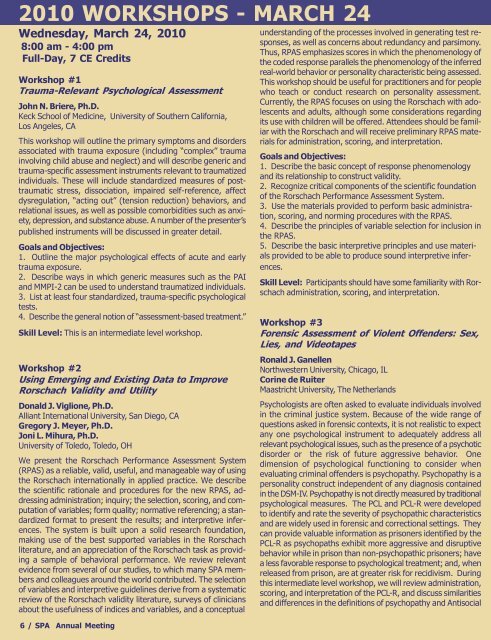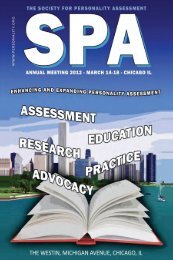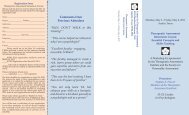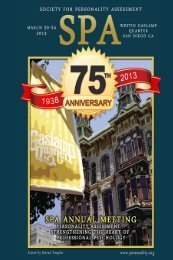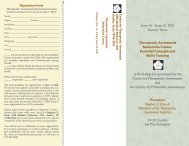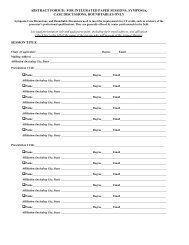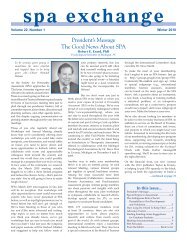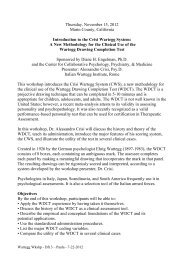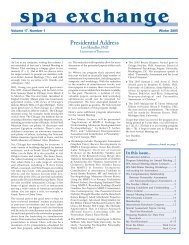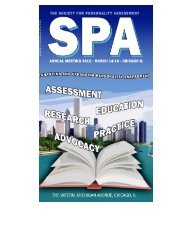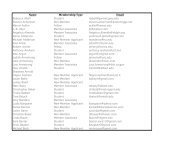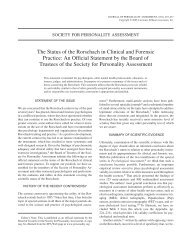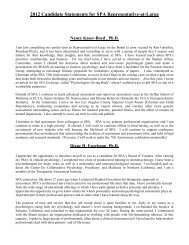From Routledge Journals - Society for Personality Assessment
From Routledge Journals - Society for Personality Assessment
From Routledge Journals - Society for Personality Assessment
You also want an ePaper? Increase the reach of your titles
YUMPU automatically turns print PDFs into web optimized ePapers that Google loves.
2010 WORKSHOPS - MARCH 24Wednesday, March 24, 20108:00 am - 4:00 pmFull-Day, 7 CE CreditsWorkshop #1Trauma-Relevant Psychological <strong>Assessment</strong>John N. Briere, Ph.D.Keck School of Medicine, University of Southern Cali<strong>for</strong>nia,Los Angeles, CAThis workshop will outline the primary symptoms and disordersassociated with trauma exposure (including “complex” traumainvolving child abuse and neglect) and will describe generic andtrauma-specific assessment instruments relevant to traumatizedindividuals. These will include standardized measures of posttraumaticstress, dissociation, impaired self-reference, affectdysregulation, “acting out” (tension reduction) behaviors, andrelational issues, as well as possible comorbidities such as anxiety,depression, and substance abuse. A number of the presenter’spublished instruments will be discussed in greater detail.Goals and Objectives:1. Outline the major psychological effects of acute and earlytrauma exposure.2. Describe ways in which generic measures such as the PAIand MMPI-2 can be used to understand traumatized individuals.3. List at least four standardized, trauma-specific psychologicaltests.4. Describe the general notion of “assessment-based treatment.”Skill Level: This is an intermediate level workshop.Workshop #2Using Emerging and Existing Data to ImproveRorschach Validity and UtilityDonald J. Viglione, Ph.D.Alliant International University, San Diego, CAGregory J. Meyer, Ph.D.Joni L. Mihura, Ph.D.University of Toledo, Toledo, OHWe present the Rorschach Per<strong>for</strong>mance <strong>Assessment</strong> System(RPAS) as a reliable, valid, useful, and manageable way of usingthe Rorschach internationally in applied practice. We describethe scientific rationale and procedures <strong>for</strong> the new RPAS, addressingadministration; inquiry; the selection, scoring, and computationof variables; <strong>for</strong>m quality; normative referencing; a standardized<strong>for</strong>mat to present the results; and interpretive inferences.The system is built upon a solid research foundation,making use of the best supported variables in the Rorschachliterature, and an appreciation of the Rorschach task as providinga sample of behavioral per<strong>for</strong>mance. We review relevantevidence from several of our studies, to which many SPA membersand colleagues around the world contributed. The selectionof variables and interpretive guidelines derive from a systematicreview of the Rorschach validity literature, surveys of cliniciansabout the usefulness of indices and variables, and a conceptual6 / SPA Annual Meetingunderstanding of the processes involved in generating test responses,as well as concerns about redundancy and parsimony.Thus, RPAS emphasizes scores in which the phenomenology ofthe coded response parallels the phenomenology of the inferredreal-world behavior or personality characteristic being assessed.This workshop should be useful <strong>for</strong> practitioners and <strong>for</strong> peoplewho teach or conduct research on personality assessment.Currently, the RPAS focuses on using the Rorschach with adolescentsand adults, although some considerations regardingits use with children will be offered. Attendees should be familiarwith the Rorschach and will receive preliminary RPAS materials<strong>for</strong> administration, scoring, and interpretation.Goals and Objectives:1. Describe the basic concept of response phenomenologyand its relationship to construct validity.2. Recognize critical components of the scientific foundationof the Rorschach Per<strong>for</strong>mance <strong>Assessment</strong> System.3. Use the materials provided to per<strong>for</strong>m basic administration,scoring, and norming procedures with the RPAS.4. Describe the principles of variable selection <strong>for</strong> inclusion inthe RPAS.5. Describe the basic interpretive principles and use materialsprovided to be able to produce sound interpretive inferences.Skill Level: Participants should have some familiarity with Rorschachadministration, scoring, and interpretation.Workshop #3Forensic <strong>Assessment</strong> of Violent Offenders: Sex,Lies, and VideotapesRonald J. GanellenNorthwestern University, Chicago, ILCorine de RuiterMaastricht University, The NetherlandsPsychologists are often asked to evaluate individuals involvedin the criminal justice system. Because of the wide range ofquestions asked in <strong>for</strong>ensic contexts, it is not realistic to expectany one psychological instrument to adequately address allrelevant psychological issues, such as the presence of a psychoticdisorder or the risk of future aggressive behavior. Onedimension of psychological functioning to consider whenevaluating criminal offenders is psychopathy. Psychopathy is apersonality construct independent of any diagnosis containedin the DSM-IV. Psychopathy is not directly measured by traditionalpsychological measures. The PCL and PCL-R were developedto identify and rate the severity of psychopathic characteristicsand are widely used in <strong>for</strong>ensic and correctional settings. Theycan provide valuable in<strong>for</strong>mation as prisoners identified by thePCL-R as psychopaths exhibit more aggressive and disruptivebehavior while in prison than non-psychopathic prisoners; havea less favorable response to psychological treatment; and, whenreleased from prison, are at greater risk <strong>for</strong> recidivism. Duringthis intermediate level workshop, we will review administration,scoring, and interpretation of the PCL-R, and discuss similaritiesand differences in the definitions of psychopathy and Antisocial


